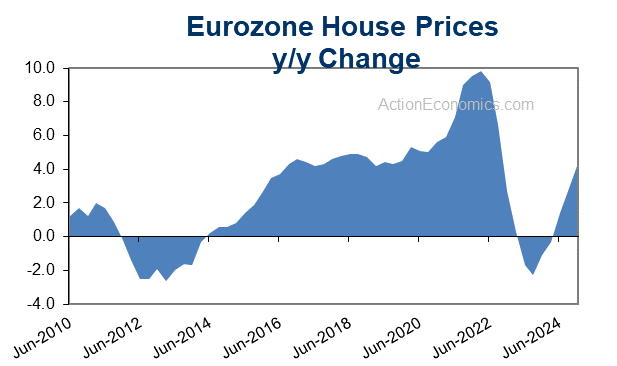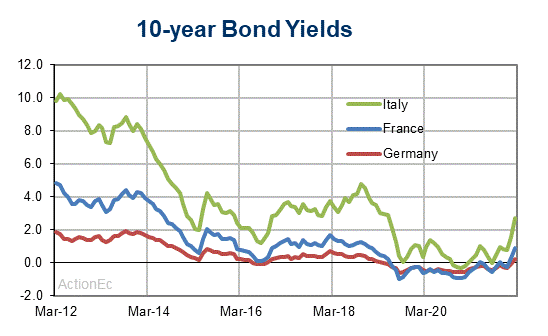Global growth has generally proven more resilient than expected even as central banks have been working overtime, hiking rates at a record clip to try to slow the demand side of the equation and rein in inflation. And while there has been some success in slowing price pressures on a y/y basis, rates still remain well above the 2% target. Those dynamics have kept monetary policy on a tightening path and will continue to do so into Q2. However, the pace of hikes, between 25 bps and 50 bps, is up for debate as policymakers weigh the cumulative effects of their actions against still elevated prices and tight labor markets.
In Europe, a much stronger than expected round of preliminary PMI reports for both the Eurozone and the UK have strengthened growth forecasts and revived rate hike expectations, especially in the UK. We continue to expect another half point rate hike from the ECB, and a further 25 basis point boost to rates from the BoE in March.

The S&P Global Eurozone Composite Output Index jumped to a 9-month high of 52.3 in February from 50.3 in the previous month. This was a broad-based improvement, with the services number rising to an 8-month high of 53.0, and the manufacturing output index rising to 50.4. The latter signals that the sector is back in expansion territory, although the wider manufacturing PMI actually disappointed and fell back to a 2-month low of 48.5. Still, the report flagged “rising demand, healing supply chains, order book backlog reduction and improved confidence”.
On the manufacturing side energy intensive industries in chemical & plastics as well as the basic resources sector remained the main areas of weakness, although with ongoing declines in energy prices those should also start to improve. For services, the report flagged that the revival of growth in financial services activity was a key factor.
The improvement was also pretty broadly based across countries, and Germany returned to growth for the first time since June of last year. For the Eurozone as a whole, recession risks seem to be off the table, especially as the survey suggested that orders finally picked up — for the first time since May last year.
The ECB’s updated set of forecasts, due next month, are even more likely to bring marked upward revisions to growth projections after these numbers. At the same time, respondents reported a rise in employment across both sectors, and optimism about the year ahead rose to a one-year high. Input cost inflation declined in the manufacturing sector, but accelerated further across services sectors and average prices charged for goods as well as services “increased at solid rates”, albeit at a slightly slower pace than at the start of the year.
The strong improvement in PMI reports came alongside a further jump in German ZEW investor confidence, at the highest reading since the start of the Ukraine war, and it suggests further improvement in activity ahead. Eurozone consumer confidence also still remains in negative territory. Headline inflation is slowing, and the risk of energy rationing is off the table. As wage growth picks up and disposable income steadies, consumer confidence is also likely to improve further, although rising interest rates will hurt in countries with high levels of mortgage debt.
 ECB President Lagarde re-affirmed the central bank’s commitment to deliver another half point rate hike at the next meeting. At the same time, comments from other council members over the past week have highlighted that the dovish camp at the ECB is ready to fight for a slowdown in the pace at subsequent meetings. Executive Board member Panetta suggested that smaller moves allow for better calibration of policy settings, warning that he would consider it unwise to move very fast against the background of heightened uncertainty. Panetta also stressed that previous rate hikes are still filtering through the system. ECB chief economist Lane also flagged the time-delay with which monetary policy impacts the behavior of households and firms.
ECB President Lagarde re-affirmed the central bank’s commitment to deliver another half point rate hike at the next meeting. At the same time, comments from other council members over the past week have highlighted that the dovish camp at the ECB is ready to fight for a slowdown in the pace at subsequent meetings. Executive Board member Panetta suggested that smaller moves allow for better calibration of policy settings, warning that he would consider it unwise to move very fast against the background of heightened uncertainty. Panetta also stressed that previous rate hikes are still filtering through the system. ECB chief economist Lane also flagged the time-delay with which monetary policy impacts the behavior of households and firms.
By contrast Executive Board member Schnabel suggested that markets may underestimate inflation, adding that “we are still far away from claiming victory” over inflation. She even warned that the economy’s reaction to interest rate increases may prove weaker than in previous tightening cycles, adding that if that proved to be the case “we may have to act more forcefully”. The debate at the next meeting is likely to be a lively one, and we suspect that the compromise will be a signal of a slowdown in pace, coupled with a focus on data dependency. We continue to expect at least two more 25 basis point rate hikes after the half point hike in March, alongside a clear signal that rate cuts won’t be on the agenda this year unless there is a dramatic and unexpected turn in global events.
The sharp improvement in confidence indicators may favor the hawkish camp at the ECB, but EURUSD still remains at the mercy of the FOMC outlook, as markets settle for a “higher for longer” scenario not just in the Eurozone. As long as the ECB doesn’t look decidedly more hawkish than the Fed, the single currency is likely to continue to struggle.
Click here to access our Economic Calendar
Andria Pichidi
Market Analyst
Disclaimer: This material is provided as a general marketing communication for information purposes only and does not constitute an independent investment research. Nothing in this communication contains, or should be considered as containing, an investment advice or an investment recommendation or a solicitation for the purpose of buying or selling of any financial instrument. All information provided is gathered from reputable sources and any information containing an indication of past performance is not a guarantee or reliable indicator of future performance. Users acknowledge that any investment in Leveraged Products is characterized by a certain degree of uncertainty and that any investment of this nature involves a high level of risk for which the users are solely responsible and liable. We assume no liability for any loss arising from any investment made based on the information provided in this communication. This communication must not be reproduced or further distributed without our prior written permission.

